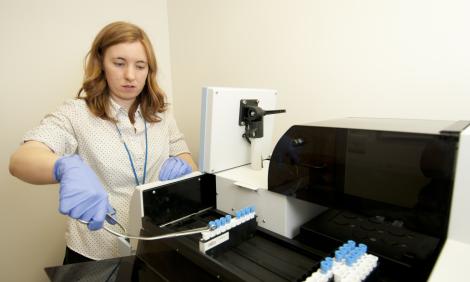NHS Scientist Training Programme
The NHS Scientist Training Programme (STP) may be for you if you are a science or engineering graduate.
You can train to work in a senior healthcare science role in one of the following areas:
- clinical bioinformatics (including genomics, physical sciences and health informatics)
- life sciences (including andrology, cancer genomics, clinical biochemistry, clinical immunology, genomics, genomic counselling, haematology/transfusion science, histocompatibility and immunogenetics, histopathology, microbiology and reproductive science)
- physical sciences and biomedical engineering (including clinical engineering (eg rehabilitation engineering), clinical pharmaceutical science, medical physics (eg nuclear medicine, radiotherapy physics, radiation safety, imaging (ionising), imaging (non-ionising), MRI and ultrasound) and reconstructive science)
- physiological sciences (including audiology, cardiac science, critical care science, gastrointestinal physiology, neurophysiology, ophthalmic and vision science, respiratory and sleep science, urodynamic science and vascular science)
Not all specialisms are available every year through the STP, so it's essential to check during the STP recruitment window (see below for details of the latest recruitment round).

The programme
You'll be employed on a fixed-term contract and paid a salary during your training.
The STP lasts for three years and involves:
- approved and accredited workplace-based training (you'll usually spend the first year in a range of settings and then specialise in the last two years)
- gaining a master’s degree in your chosen area of work
Once you have completed the STP, you will be eligible to apply for suitable healthcare science posts as a clinical scientist.
Find out more about the various healthcare science roles in clinical bioinformatics, life sciences, physical sciences and biomechanical engineering and physiological sciences
Charlotte Harborow
Trainee clinical scientist
Read Charlotte's storyWorking while training means I can also raise real-life cases with my training officer and gain more of an understanding of the course.
Entry requirements
Applicants must have a 1st or 2.1 either in an undergraduate honours degree or an integrated master’s degree in a pure or applied science subject relevant to the specialism for which they are applying.
However, if you have a 2.2 honours degree you may submit an application if you also have a higher degree (a degree completed after a bachelor's degree, at a more advanced level such as an MSc) in a relevant subject for the specialty being applied to.
For all candidates evidence of research experience, e.g. in the form of a higher degree or equivalent evidence of scientific and academic capability, is considered desirable.
Recruitment for 2025 entry
The application window for the NHS Scientist Training Programme for direct entry in 2025 is open from 11am Thursday 23 January to 4pm Thursday 6 February 2025.
The recruitment process for the NHS Scientist Training Programme is administered by the National School for Healthcare Science. For the latest details about the STP recruitment process, visit the National School's website where you can find:
- details of the programme
- information about which specialisms are available
- the application process
- the interview process
- details of open days
- case studies
- FAQs
- important documents
You can also follow the National School @NSHCS and Health Careers @HealthCareersUK on Twitter




